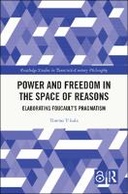Explore

Power and Freedom in the Space of Reasons
Tuomo Tiisala
2025
0 Ungluers have
Faved this Work
Login to Fave
This book argues that the received view of the distinction between freedom and power must be rejected because it rests on an untenable account of the discursive cognition that endows individuals with the capacity for autonomy and self-governed rationality. In liberal and Kantian approaches alike, the autonomous subject is a self-standing starting point whose freedom is constrained by relations of power only contingently because they are external to the subject’s constitution. Thus, the received view defines the distinction between freedom and power as a dichotomy. Michel Foucault is arguably the most important critic of that dichotomy. However, it is widely agreed that Foucault falls short of justifying the alternative view he develops, where power and freedom are essentially entangled instead. The book fills out the gap by investigating the social preconditions of discursive cognition. Drawing on pragmatist-inferentialist resources from the philosophy of language (Wittgenstein, Sellars, and Brandom), it presents a new interpretation of Foucault’s philosophy that is unified by his overlooked idea of “the archaeology of knowledge.” As a result, the book not only explains why and how power and freedom must be entangled but also what it means ethically to pursue and gain autonomy with respect to one’s own understanding. Power and Freedom in the Space of Reasons will appeal to scholars and advanced students working in social and political philosophy, critical theory, ethics, philosophy of language, and the history of 20th-century philosophy. The Open Access version of this book, available at www.taylorfrancis.com, has been made available under a Creative Commons Attribution-Non Commercial (CC-BY-NC) 4.0 license. Any third party material in this book is not included in the OA Creative Commons license, unless indicated otherwise in a credit line to the material. Please direct any permissions enquiries to the original rightsholder. This research was funded in whole or in part by the Austrian Science Fund (FWF) [10.55776/COE3]. For open access purposes, the author has applied a CC BY-NC public copyright license to any author-accepted manuscript version arising from this submission. Published with the support of the Austrian Science Fund (FWF): 10.55776/PUB1157
This book is included in DOAB.
Why read this book? Have your say.
You must be logged in to comment.
Rights Information
Are you the author or publisher of this work? If so, you can claim it as yours by registering as an Unglue.it rights holder.Downloads
This work has been downloaded 44 times via unglue.it ebook links.
- 44 - pdf (CC BY-NC) at Unglue.it.
Keywords
- 20th-Century Philosophy
- archaeology of knowledge
- autonomy
- Brandom
- discursive cognition
- Foucault
- Freedom
- inferentialism
- modalities of power
- philosophy of language
- Political Philosophy
- Power
- Pragmatism
- self-constitution
- Sellars
- Social Philosophy
- sovereign subject
- structural heteronomy
- thema EDItEUR::C Language and Linguistics::CF Linguistics::CFA Philosophy of language
- thema EDItEUR::J Society and Social Sciences::JP Politics and government::JPA Political science and theory
- thema EDItEUR::Q Philosophy and Religion::QD Philosophy::QDH Philosophical traditions and schools of thought::QDHR Western philosophy from c 1800
- thema EDItEUR::Q Philosophy and Religion::QD Philosophy::QDT Topics in philosophy::QDTQ Ethics and moral philosophy
- thema EDItEUR::Q Philosophy and Religion::QD Philosophy::QDT Topics in philosophy::QDTS Social and political philosophy
- Tuomo Tiisala
- Wittgenstein
Links
DOI: 10.4324/9781032673035Editions

